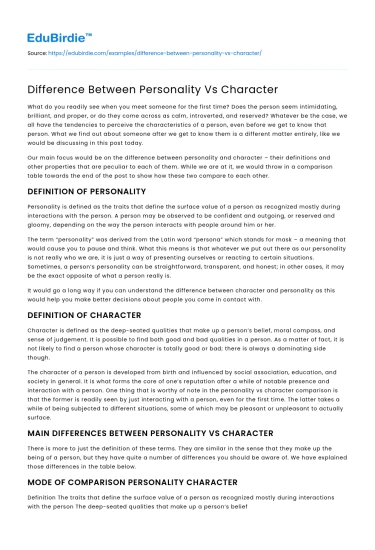What do you readily see when you meet someone for the first time? Does the person seem intimidating, brilliant, and proper, or do they come across as calm, introverted, and reserved? Whatever be the case, we all have the tendencies to perceive the characteristics of a person, even before we get to know that person. What we find out about someone after we get to know them is a different matter entirely, like we would be discussing in this post today.
Our main focus would be on the difference between personality and character – their definitions and other properties that are peculiar to each of them. While we are at it, we would throw in a comparison table towards the end of the post to show how these two compare to each other.
Save your time!
We can take care of your essay
- Proper editing and formatting
- Free revision, title page, and bibliography
- Flexible prices and money-back guarantee
DEFINITION OF PERSONALITY
Personality is defined as the traits that define the surface value of a person as recognized mostly during interactions with the person. A person may be observed to be confident and outgoing, or reserved and gloomy, depending on the way the person interacts with people around him or her.
The term “personality” was derived from the Latin word “persona” which stands for mask – a meaning that would cause you to pause and think. What this means is that whatever we put out there as our personality is not really who we are, it is just a way of presenting ourselves or reacting to certain situations. Sometimes, a person’s personality can be straightforward, transparent, and honest; in other cases, it may be the exact opposite of what a person really is.
It would go a long way if you can understand the difference between character and personality as this would help you make better decisions about people you come in contact with.
DEFINITION OF CHARACTER
Character is defined as the deep-seated qualities that make up a person’s belief, moral compass, and sense of judgement. It is possible to find both good and bad qualities in a person. As a matter of fact, it is not likely to find a person whose character is totally good or bad; there is always a dominating side though.
The character of a person is developed from birth and influenced by social association, education, and society in general. It is what forms the core of one’s reputation after a while of notable presence and interaction with a person. One thing that is worthy of note in the personality vs character comparison is that the former is readily seen by just interacting with a person, even for the first time. The latter takes a while of being subjected to different situations, some of which may be pleasant or unpleasant to actually surface.
MAIN DIFFERENCES BETWEEN PERSONALITY VS CHARACTER
There is more to just the definition of these terms. They are similar in the sense that they make up the being of a person, but they have quite a number of differences you should be aware of. We have explained those differences in the table below.
MODE OF COMPARISON PERSONALITY CHARACTER
Definition The traits that define the surface value of a person as recognized mostly during interactions with the person The deep-seated qualities that make up a person’s belief, moral compass, and sense of judgement
Meaning Face-level abilities, attitude, and carriage. Represents who we seem to be Moral attributes and qualities that form the reputation of a person. Represents who we really are.
- Time Does not take a lot of time to point out Takes quite some time to point out
- Traits Personal and physical traits Moral and mental traits
- Nature Subjective in nature Objective in nature
- Validation of society Not required Required
CONCLUSION
Do you think the personality or character of a person can change? The truth is, yes, they can. But the former is more susceptible to change than the latter. Let us summarize the character vs personality comparison with “mood”.
When you are in a good mood, for instance, it is possible to be in your best behavior. You are in better control of your emotions and tend to be assertive. But when you are not in a good mood, you may ditch all that and act in a manner that is in line with your inner person and belief.






 Stuck on your essay?
Stuck on your essay?

